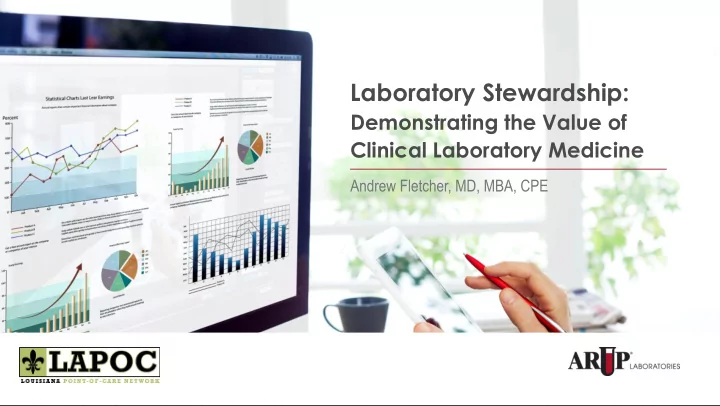

Laboratory Stewardship: Demonstrating the Value of Clinical Laboratory Medicine Andrew Fletcher, MD, MBA, CPE
Agenda Background Stewardship Committee Interventions Result Downstream Impact 2
Background 3 most significant causes 13 billion tests performed of patient harm: • Ordering the wrong test 70% decisions based • Failing to retrieve a test result 10 – 30% unnecessary • Misinterpreting a test result 3
Radiology Utilization Management Blood Utilization Trends in Healthcare Laboratory Stewardship Antimicrobial Stewardship Pharmacy Utilization Management 4
Agenda Background Stewardship Committee Interventions Result Downstream Impact 5
Creating Successful Laboratory Stewardship 1/3 Success Factors of labs have a stewardship program Data Analysis 1/2 Formal Governance of those labs have a productive Evidence-Based Recommendations and progressing committee IT Engagement and Support Project Management Measurement and Reporting 6
NCLS Publication http://jalm.aaccjnls.org/content/2/2/259 7
Agenda Background Stewardship Committee Interventions Result Downstream Impact 8
Interventions Three Initial Areas of Focus: 1. Test Consolidation How many reference labs do you use? 2. Reference Test Formulary Creation & implementation 3. In-House Testing Daily recurring labs Inappropriate test intervals 9
Test Consolidation How many reference laboratories do you use? 1. Is there a primary vendor? 2. Why are tests sometimes not consolidated? • Physician request • Patient request • Insurance requirement • Easier process for lab staff Free Phenytoin at Lab X $106 Free Phenytoin at Primary Lab Vendor $13 10
Interventions Three Initial Areas of Focus: 1. Test Consolidation How many reference labs do you use? 2. Reference Test Formulary Creation & implementation 3. In-House Testing Daily recurring labs Inappropriate test intervals 11
Test Formulary Review Eliminate Review all sendout test listing in remaining testing menu if test on menu performed in 1 ordered <4 to see if year times in 1 year reasonable 12
POE Optimization 13
Interventions Three Initial Areas of Focus: 1. Test Consolidation How many reference labs do you use? 2. Reference Test Formulary Creation & implementation 3. In-House Testing Daily recurring labs Inappropriate test intervals 14
Intervention Methods Proactive Reactive • Appropriate order sets • Duplicate alerts • Order management • Formulary restriction alerts • Preference list management • Best Practice Alerts • Physician education • Physician education • Physician report cards 15
Agenda Background Stewardship Committee Interventions Result Downstream Impact 16
Laboratory Stewardship Potential Annual Hospital Total Charges % Savings 195-bed hospital (Northeast) $19,600,111 $4,128,087 21% 419-bed hospital (Upper $94,511,717 $12,804,082 14% Midwest) Children’s hospital (Upper $12,635,262 $1,266,516 10% Midwest) 237-bed hospital (South) $43,047,787 $10,698,392 25% 161-bed hospital (Southwest)* $77,926,758 $9,942,054 13% 645-bed hospital (Southwest)* $211,943,118 $37,916,511 18% 199-bed hospital (Southwest)* $70,251,035 $15,813,898 23% 535-bed hospital (Southwest)* $144,127,890 $27,008,611 19% 208-bed hospital (Southwest)* $56,348,672 $10,973,516 19% 338-bed hospital (Southwest)* $78,046,058 $13,476,036 17% 18% Average This sampling of 10 engagements represent an average of 18% annual savings we found from the utilization analysis reports. These are typically the highest opportunities within the hospital, but other smaller opportunities likely exist. *All part of one system that collectively also averaged 18% in savings for over $638.6M in total charges 17
Agenda Background Stewardship Committee Interventions Result Downstream Impact 18
70% of medical decisions are influenced by laboratory 13 billion data laboratory tests performed annually 3% in the U.S. of U.S. healthcare expenditures spent on laboratory services 19
Downstream Impact • Case Management − Length of stay − Denials of payments • Pharmacy − Expensive biologic agents − Pharmacogenomics • Radiology 20
Troponin orders and Chest Pain LOS 21
Troponin I 4000 3500 3,587 2,965 3500 3000 3000 2500 2500 2000 2000 1500 4,410 1500 1000 1000 500 500 0 0 0 0.0 0.5 0.5 1 1.0 1.5 1.5 2 2.0 2.5 2.5 3 3.0 3.5 3.5 4 4.0 4.5 4.5 5 5.0 5.5 5.5 6 6.0 6.5 6.5 7 7.0 7.5 7.5 8 8.0 8.5 8.5 9 9.0 9.5 9.5 10 10.0 10.5 10.5 11 11.0 11.5 11.5 12 12+ 12+ Improve the time-to-decision by Identify order Modify the repeat time mechanisms that drive improving the test interval by up to be 3-6 hours after the repeat interval to 3 hours 22
Downstream Impact on Pharmacy Expensive Biologic Agents • TNF antagonists − Infliximab (Remicade) − Adalimumab (Humira) • Hepatitis C antiviral agents − NS5A/NS3A inhibitors 23
Pharmacogenetics Coagulation Clopidogrel (Plavix) • CYP2C19 Warfarin (Coumadin) • CYP2C9 and VKORC1 24
Drug % of Patients Primary gene ARUP Employee Health 9.15% Hydrocodone CYP2D6 8.31% Omeprazole CYP2C19 7.55% Ondansetron CYP2D6 6.49% Bupropion ANKK1 Clinic Project 6.02% Sertraline CYP2C19 6.00% Oxycodone CYP2D6 5.06% Citalopram CYP2C19 4.92% Metformin ATM 4.86% Fluoxetine CYP2D6 • Based on pharmacy claims data for ~5000 4.14% Trazodone CYP3A4 3.98% Atorvastatin CYP3A4 patients, 83% of actionable drug-gene 3.72% Codeine CYP2D6 3.30% Escitalopram CYP2C19 interactions relate to the CYPs. 3.08% Amphetamine COMT 2.96% Tramadol CYP2D6 2.74% Diclofenac CYP2C9 • Implementing the CYP panel because drug- 2.16% Clonazepam CYP3A4 2.16% Alprazolam CYP3A4 gene interactions are of the HIGHEST levels of 2.14% Duloxetine CYP2D6 1.94% Simvastatin SLCO1B1 evidence. 1.80% Meloxicam CYP2C9 1.70% Quetiapine CYP3A4 1.60% Methylphenidate MTHFR • Inviting ~400 patients to obtain PGx testing with 1.46% Buspirone CYP3A4 1.30% Tamsulosin CYP2D6 enrolment anticipated to begin in May 2019. 1.30% Amitriptyline CYP2D6 1.28% Venlafaxine CYP2D6 1.28% Propranolol CYP2D6 1.28% Ketoconazole CYP3A4 1.12% Diazepam CYP2C19 1.04% Metoprolol CYP2D6 0.92% Pantoprazole CYP2C19 25
CT PE Protocol 26 26
27
D-Dimer and CT PE Protocol 28 28
Percent of Patient Contacts Getting CT PE Scans • Average percent of patients receiving CT PE scan in months prior to Aug 2015 (n=7) = 4.58% Average percent of patients receiving CT PE scan in months after Aug 2015 (n=15) = 3.14% • (two sample t-test, p<0.05) 29
Agenda Background Stewardship Committee Interventions Result Downstream Impact 30
Laboratory Stewardship: Demonstrating the Value of Clinical Laboratory Medicine Andrew Fletcher, MD, MBA, CPE
Recommend
More recommend